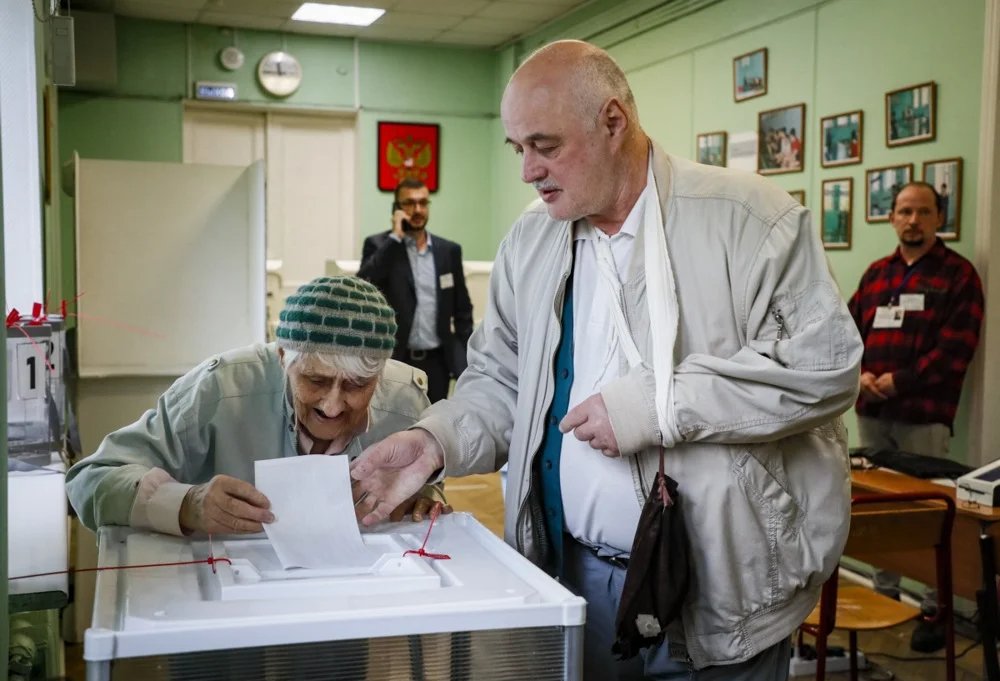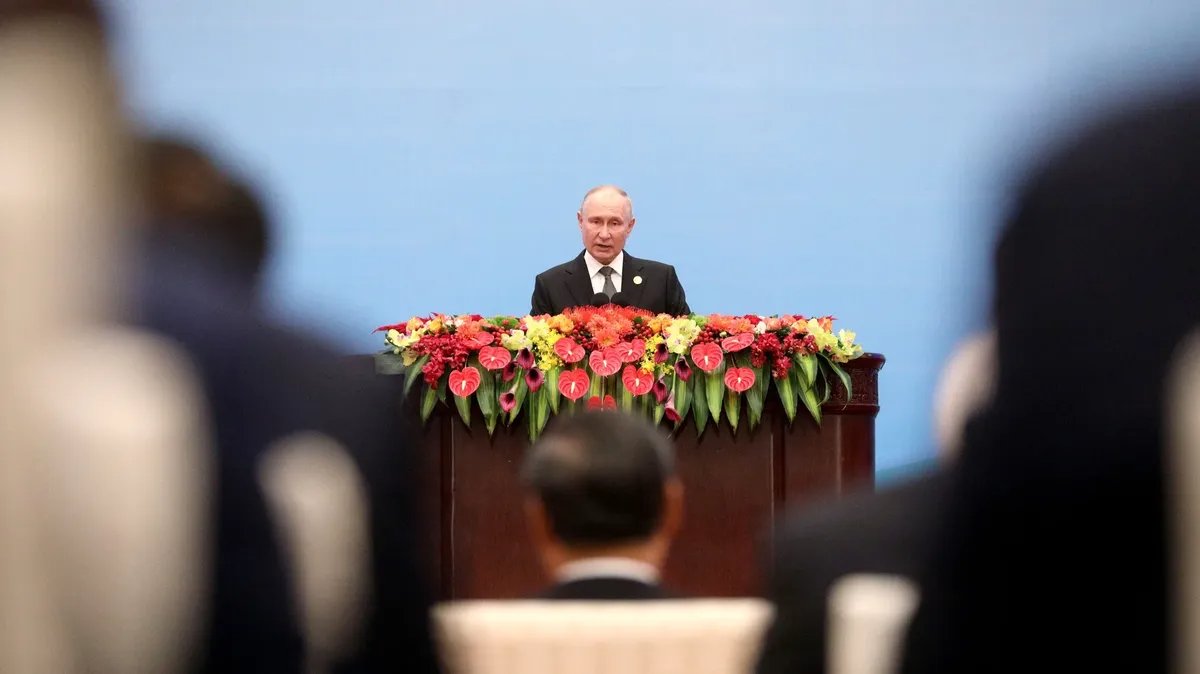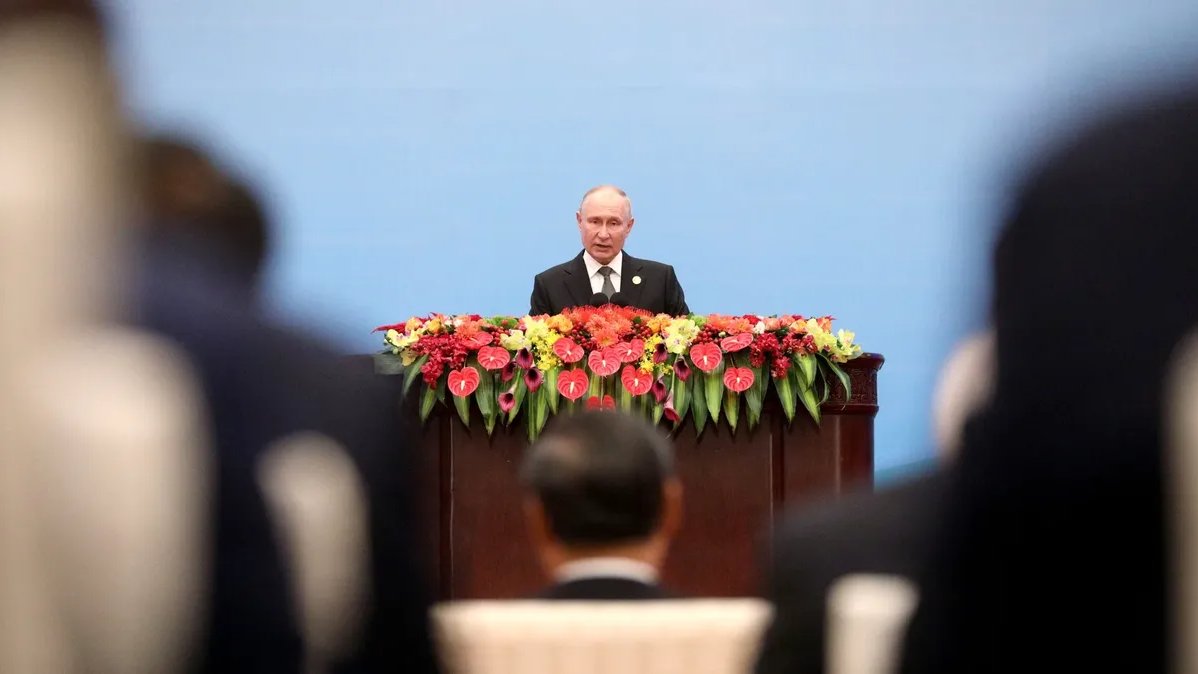Vladimir Putin will soon be launching his re-election campaign, or the pale imitation of what passes for one in a military dictatorship. With his prospects of winning all but certain in a system designed to deliver him victory, the situation may seem hopeless, but is still worth the fight.
In a recent change in his rhetoric to supporters, the Russian dictator has begun speaking less about war, preferring instead to perform benevolent miracles from on high to benefit ordinary citizens while also burnishing his credentials in the fight against American hegemony as the leader of the Global South.
The decline in the president’s interest in the war can be seen as a good sign: his administration understands that other issues should take centre stage in the upcoming election campaign. Putin’s war is unpopular, with recent polls showing a majority of Russians now in favour of peace negotiations. While officially the dictator does still enjoy a high level of support, everyone would be happy if he ended the war tomorrow as normalisation and peace are more important issues for most people in Russia today.
This means that Russia’s opposition politicians face a difficult choice. Given the Kremlin’s isolation of real candidates such as Alexey Navalny, the fact that political persecution and fear make having a fair election campaign impossible, that independent media has been forced into exile, that there are endless ways the dictatorship can rig the election results, and that the Russian opposition is plagued by infighting and wouldn’t even be able to agree on a unity candidate, it’s totally valid to argue that it’d be pointless to vote in the current conditions.
Where would a boycott lead?
These considerations aside, the manner in which Putin launches this next electoral cycle is extremely important for the future of the country, especially to those who are only too aware of the scale of the catastrophe they are experiencing. Putin’s rule is already the greatest political tragedy for Russian society since the Civil War and the Great Terror. The first military mobilisation since World War II was a crime unleashed on the Russian people by a president convinced that voters formally approved of his actions, given that the announcement was made just 10 days after regional elections in the country in which candidates who supported the war stood unchallenged across the country and received a high share of votes.
The philosopher Grigory Yudin characterises elections under Putin as a series of polls in which citizens are merely required to swear regular oaths of allegiance to the president. Therefore, any convincing victory for Putin in next year’s election will inevitably lead to a radical increase in repression and the militarisation of society. While that scenario seems almost inevitable, we should still ask whether it can be resisted.
Even official statistics show there are tens of millions of people in Russia who don’t support the war.
The anti-war movement is growing, but its public profile has been virtually wiped out by the mass arrests of those opposed to the invasion. These are the very people necessary to stop Russia’s slide into fascism. The election provides a safe way for Russians to express their attitude to the catastrophe Putin has unleashed on the country. Even a sham election can be used by Russians opposed to the war as a way of showing their numbers.
This election will also be key in ensuring the international community doesn’t give up on Russia. By demonstrating that the country is not full of monsters who support the bombing of Ukrainian cities, Russian society will make the argument that it can and should be engaged with. The voices calling on the European Union and United States not to recognise the results have recently grown louder recently, which is a step in the right direction. Either way, it will be easier for the world to distinguish Russians from their dictatorship if the Kremlin is denied a landslide.

Voting in Moscow in September. Photo: EPA-EFE/YURI KOCHETKOV
By contrast, a boycott would leave the population feeling even more isolated and disconnected than it already does, while the international community might conclude that Putin does indeed represent the Russian people. So the country has to vote.
Fielding a single opposition candidate in a military dictatorship seems a proposal doomed from the get-go, however, not least as it would be impossible to run an election campaign from abroad — the propaganda machine would have a field day depicting any candidate outside the country as an enemy of Russia in receipt of foreign funding. Perhaps more significantly, the Kremlin would never allow a genuine opposition candidate onto the ballot. And even if it did, the candidate could well end up paying with their life.
A bastard, but our bastard
So is waging a political campaign without an anti-war candidate impossible? In my opinion, no. In the absence of its own candidate, the opposition could use the campaign to highlight all the ways Putin has robbed Russians of their future. Politicians, actors and public figures, supported by independent media, could emphasise how people’s lives would improve with Putin gone. Focusing on the very real issue of Russian war crimes during the campaign would not be an effective strategy however, as research has shown that the Russian public is interested in matters that affect them directly.
The campaign would have to recognise the value of tactical voting in lieu of a good candidate, and agree on one candidate for the whole anti-war movement to get behind.

Putin addresses a press conference on 18 October following his visit to China. Photo: kremlin.ru
That candidate may be deeply unpalatable, but in campaign terms, a ballot cast for them counts as a protest vote, and that’s all that matters.
This is where the tragedy of Russian democracy is exposed at its most farcical, but it’s better to take an active stand against Putin’s dance of death than a passive one.
After all, literally anyone other than the current president would offer Russians a better chance of living normal lives again.
The house always wins
Given that reality and public opinion count for so little in contemporary Russia, it’s almost impossible to stand in the way of Putin’s re-election. I say this not by way of announcing an editorial position on the upcoming contest, but as a Russian citizen. Whatever tactic the opposition adopts, Putin will emerge victorious. The fundamental bias of the Russian electoral system is a feature not a bug.
But there are still pragmatic outcomes worth fighting for including consolidating protest votes for an alternative candidate, actively involving opinion-leaders in the anti-war campaign to mobilise people to vote for an opposition candidate, and presenting voters with a viable alternative to Putin.
Just three years ago, 16 million people voted to reject Kremlin-backed changes to the Russian Constitution that amounted to little more than a power grab, more than 20% of voters. If that figure could be doubled in next year’s presidential election, what was envisaged as a one-man show could well become a starting point in Russia’s journey towards peace and a better future.
Join us in rebuilding Novaya Gazeta Europe
The Russian government has banned independent media. We were forced to leave our country in order to keep doing our job, telling our readers about what is going on Russia, Ukraine and Europe.
We will continue fighting against warfare and dictatorship. We believe that freedom of speech is the most efficient antidote against tyranny. Support us financially to help us fight for peace and freedom.
By clicking the Support button, you agree to the processing of your personal data.
To cancel a regular donation, please write to [email protected]

